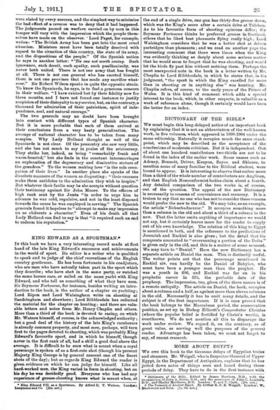KING EDWARD AS A SPORTSMAN.*
IN this book we have a very interesting record made at first hand of the late King Edward's successes and achievements in the world of sport. Its editor is a writer who is qualified to speak and to judge of the chief recreations of the English country gentleman. He has been fortunate in. his coadjutors, who are men who have actually taken part in the sport which they describe ; who have shot in the same party, or watched the same horses race, or sailed on the same yacht with King Edward, and who tell us something of what they have seen. Sir Seymour Fortescue, for instance, besides writing an intro- duction to the book, is the author of a chapter on yachting ; Lord Ripon and Lord Walsingham write on shooting at Sandringham and elsewhere; Lord Ribblesdale has collected the material for the chapter on hunting ; and there are valu- able letters and notes from Mr. Henry Chaplin and others. More than a third of the book is devoted to racing, on which Mr. Watson himself, of course, is the acknowledged authority ; but a good deal of the history of the late King's racehorses is already common property, and most men, perhaps, will turn first to the pages devoted to shooting, which was probably King Edward's favourite sport, and in which he himself, though never in the first rank of all, had a skill a good deal above the average. It is difficult to be sure what is meant when a royal personage is spoken of as a first-rate shot (though his present Majesty King George is by general consent one of the finest shots of the day); but as regards King Edward the reader is given evidence on which he can judge for himself. Like all bard-worked men, the King varied in ferns in shooting, but on his day he was decidedly good. Everyone who has had any experience of grouse-shooting knows what is meant when, at • ling Edward VIE. as a Sportsman. By Alfred E. T. Watson. London Longman. and CA [21s. net.]
the end of a single drive, one gun has thirty-five grouse down, which was the King's score after a certain drive at Tulchan. As to his favourite form of shooting opinions differ; Sir Seymour Fortescue thinks he preferred grouse in Scotlaud, others that he liked best pheasants flying really high ; Lord Walsingham considers that he was a better shot at driven partridges than pheasants ; and we read on another page the interesting comment that there were times when the King was evidently thinking so deeply about some serious matter that he would seem to forget that he was shooting, and would let the birds fly past him without noticing them. Perhaps the most unexpected note in the book is a letter written by Mr. Chaplin to Lord Ribblesdale, in which he states that, in his judgment, " the sport in which the King excelled far more than in shooting or in anything else " was hunting. Mr. Chaplin refers, of course, to the early years of the Prince of Wales. It is this kind of comment which adds a special interest to the book, which, in other respects, is valuable as a work of reference alone, though it certainly would have been the better for an index.














































 Previous page
Previous page